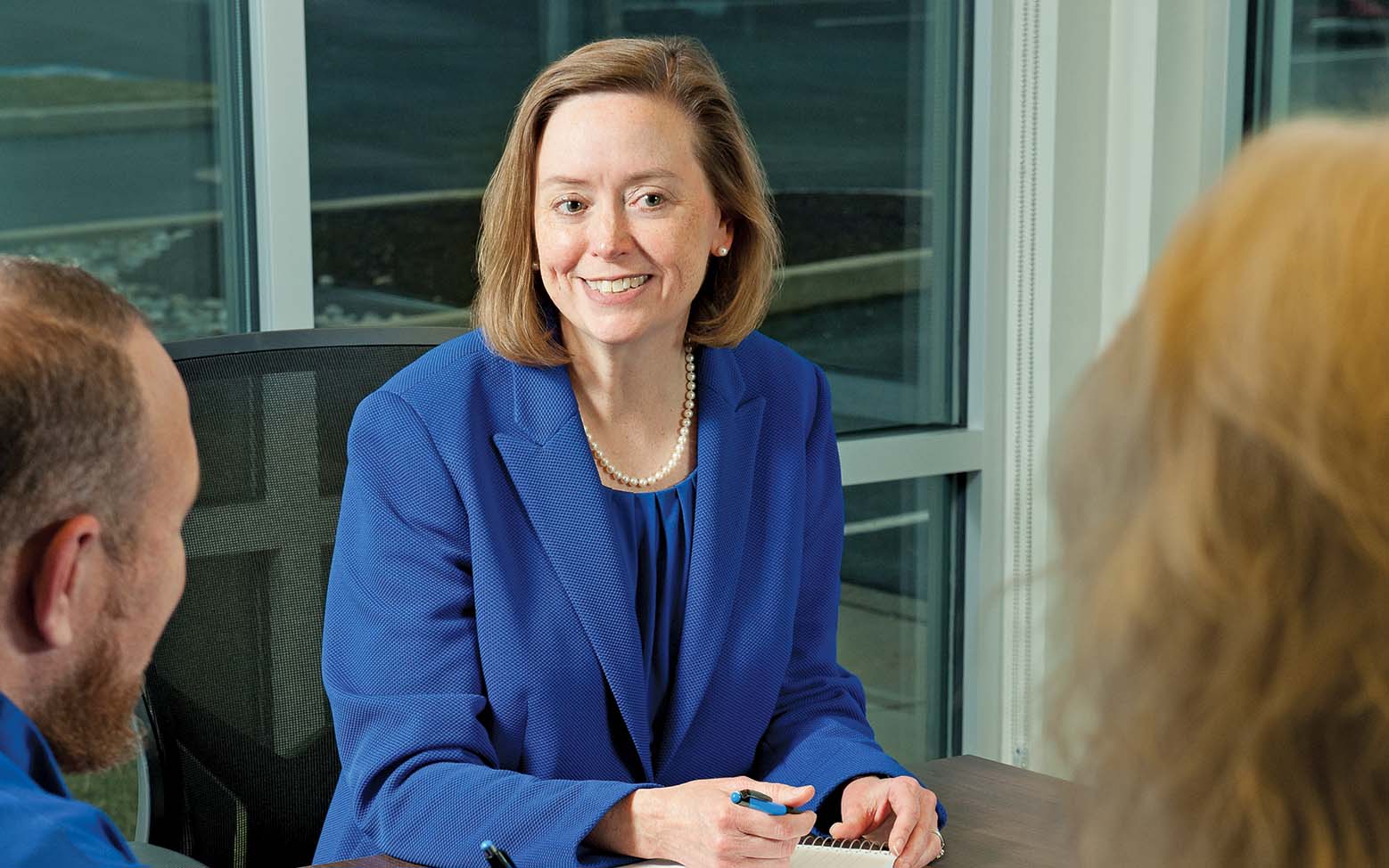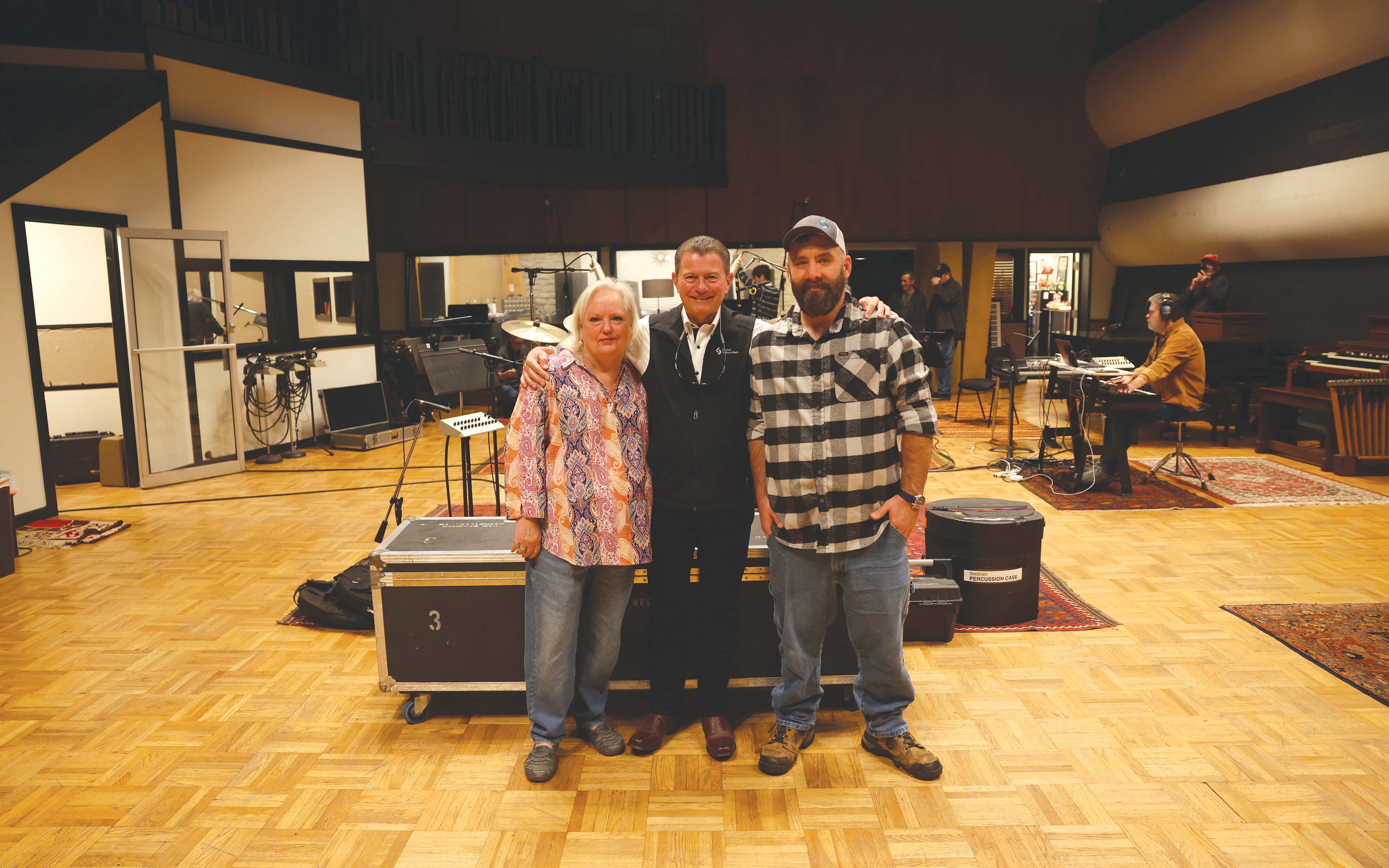ICBA’s 2025/26 board members hail from all corners of the country and are ready to fight for the continued success of the community banking industry. Executive committee members tell us what they’ll be laser-focused on during their term, and members of the broader board pass on words of wisdom about leadership and success in banking.
Meet ICBA’s 2025/26 Board of Directors
0425 Board of Directors 2k
April 01, 2025 / By Rachel Hatcher
ICBA’s 2025/26 board members hail from all corners of the country and are ready to fight for the continued success of the community banking industry. Executive committee members tell us what they’ll be laser-focused on during their term, and members of the broader board pass on words of wisdom about leadership and success in banking.
The members of ICBA’s 2025/26 board of directors have proven track records of speaking up on the biggest issues the community banking industry faces. Many of them—including chairman Jack E. Hopkins, chairman-elect Alice Frazier, bank operations committee chairman Sarah Getzlaff, president and CEO Rebeca Romero Rainey and more—have testified to Congress, financial committees and other bodies, such as the FDIC.
“This year’s board represents the strength and diversity of community banking, bringing decades of leadership and an unwavering commitment to our industry,” says Romero Rainey. “This group exemplifies the mission and values of ICBA, and their service will help us champion the policies and innovations that empower community banks and their customers nationwide.”
Here, we go in-depth with the executive committee members to find out how they plan to go the extra mile for your community bank and the industry. Read on to hear from the rest of the board as they start this important work.
Q: What are your goals for your executive committee term?
Jack E. Hopkins: I am hoping that during my term we can inspire more bankers to become actively involved in the state associations, national association and in grassroots lobbying. We have a lot of opportunity this year, and we need grassroots effort.
Alice P. Frazier: With [the 119th Congress and new administration] in mind, it is important for us to remain singularly focused on the ICBA mission and not to be distracted with the noise of politics.
Michael J. Burke Jr.: I want to get as many community bankers as possible excited about the future of our industry and passionate about fighting to make it great for the next generation.
Douglas E. Parrott: My goal is to represent all community banks to assist ICBA in its mission to create and promote an environment where all community banks flourish through effective advocacy, education and innovation.
Quentin Leighty: To me, [community banks flourishing] means telling our story across the country and in D.C. We have a lot of important priorities, and I plan to help deploy the offensive strategy.
Lucas White: I want to encourage more community bankers to get involved. The more community bankers we have telling their personal stories in D.C., the stronger our message will be.
Derek B. Williams: I want to help ICBA take advantage of what we all believe is a tremendous opportunity to get some common-sense, appropriate and properly tiered regulatory relief to help our banks more effectively serve our customers and our communities.
Brad M. Bolton: In my last term on the executive committee, I want to be a mentor to our newly elected members, help bring historical, mission-driven background to discussions and always be an open ear to those who matter most: [ICBA’s] valued community bank members.
Shon B. Myers: Consolidated holdings subsidiaries provide great value and service to community banks across the nation. My goal is to ensure we continue to offer the products and services banks need, and at prices that help community banks continue to thrive.
Words to live and work by
Members of the 2025/26 ICBA board of directors share the best advice they’ve received during their career.
“Two [pieces of advice] that really stand out to me are ‘Change is the only constant in business’ and ‘Just because it has always been done that way does not make it right.’”—Noah W. Wilcox, ICBA past chairman, and president, CEO and chairman of Minnesota Lakes Bank in Delano, Minn., Grand Rapids State Bank and its holding company, Wilcox Bancshares Inc., in Grand Rapids, Minn.
“It is easier to ask for forgiveness than it is to ask for permission. Take chances and be daring. Don’t bet the bank, but don’t be afraid to think differently and try new things, both personally and professionally.”—Robert M. Fisher, ICBA past chairman, and chairman, president and CEO of Tioga State Bank, N.A., in Spencer, N.Y.
“You can do many ‘foolish’ things as a banker, so long as you don’t make bad loans. Maintaining a diverse balance sheet, particularly a diversified loan portfolio, is vital for ensuring a safe-and-sound bank.”—John “JV” Evans III, ICBA at-large director, Federal Delegate Board representative, and CEO of D.L. Evans Bank in Boise, Idaho
“Be as broad as possible or a generalist who has multiple relevant skills. [Secondly,] always volunteer or speak up for any new opportunity or project, versus waiting to be selected.”—James H. Sills III, ICBA at-large director, and president and CEO of Mechanics and Farmers Bank in Durham, N.C.
“Character is who you are when no one is watching. As a banker, I want to live my life and operate our bank with that viewpoint and in a manner that is above reproach.”—Gay Dempsey, ICBA at-large director, Federal Delegate Board representative, and CEO of Bank of Lincoln County in Fayetteville, Tenn.
“Sometimes 80% is good enough. It is true that for some things you don’t have to be at 100% and that you can let some things be fine at 80% to save your sanity.”—Anita Drentlaw, ICBA bank education committee chairman, and CEO, president and chief financial officer of New Market Bank in Elko New Market, Minn.
“A mentor of mine gave me advice to listen more than talk and then provide answers to questions or give guidance when appropriate.”—Brenda K. Foster, ICBA at-large director, Federal Delegate Board representative, and chairman, president and CEO of First Western Bank & Trust in Minot, N.D.
“Never stop learning new things and meeting new people. Surround yourself with amazing people that you want to become.”—Christopher C. Doyle, ICBA bank innovations and solutions committee chairman, and president and CEO of Texas First Bank in Texas City, Texas
“Don’t stop doing the things that made you successful once you get to the CEO position, or you won’t stay there very long.”—Reid B. Tingle, ICBA PAC chairman, and president and CEO of Bank of Ocean City in Ocean City, Md.
Q: Which issues do you plan to advocate for?
Hopkins: I am advocating for the reduction in the regulatory burden, particularly Section 1071 and 1033 rules. We also need to get the regulators [such as the] CFPB to change the rhetoric that banks are bad. Also, [I will be] pushing for extension or permanency of existing taxes.
Frazier: [Along with tiered regulation and repeal of 1071], I believe strongly that all communities need a community bank. Therefore, greater access to capital and simplified de novo formation rules are critical.
Burke: We need the amount of capital needed to start a de novo community bank to be more realistic and feasible for the Main Street communities where a new bank would thrive. … We also need the amount of time it takes to get approval to open a new community bank shortened, so the management team can start serving their customer base.
Parrott: Having served the ICBA board of directors this past year as ICBA PAC chairman, I’ve seen firsthand the efforts … to advocate for eliminating unnecessary regulatory burden, fighting for fair and equal treatment as it pertains to credit union taxation, and assuring that ICBA has a seat at the table when important decisions are made.
Leighty: There are so many issues that it is hard to pick one, but I’d have to say, for me, it is repealing Section 1071. Businesses don’t want this, nor do bankers.
White: My top priority this year is to repeal Section 1071. [Section] 1071 will make it harder to give our small business customers the loans they need, and it needs to go.
Williams: I’d like to push for regulatory agency leadership that understands and values the importance of community banks.
Bolton: [I want to see] hearings on taxpayer-assisted credit unions buying community banks, fair treatment of community banks on tax policy and tiered/tailored bills that value who we are as community bankers and who we serve: Main Street America.
Myers: [I’m working for] regulatory relief, in particular leveraging the administration changes to hopefully eliminate many of the new requirements that community banks would have had to deal with in the next few years.
The keys to success for community banks
Board members say community banks should embody these qualities if they want to achieve their goals.
“To be a successful community bank, an organization needs to know, listen to and understand the communities it serves, the staff who make the organization work and the desires of the shareholders. If a bank can do that, success will follow.”—Noah W. Wilcox, ICBA past chairman, and president, CEO and chairman of Minnesota Lakes Bank in Delano, Minn., Grand Rapids State Bank and its holding company, Wilcox Bancshares Inc., in Grand Rapids, Minn.
“It’s important to be involved in our local communities, but it’s even more important to build a culture of community within our banks. Helping others in a time of need creates a special bond, instills a sense of pride in the helper and makes those being helped feel seen and appreciated.”—Sarah Getzlaff, ICBA bank operations committee chairman, and CEO of Security First Bank of North Dakota in Bismarck, N.D.
“Being actively involved in the community [is vital]. Everyone, including credit unions, wants to be known as community banks. A true community bank is part of the community and does not need to justify the term.”—Reid B. Tingle, ICBA PAC chairman, and president and CEO of Bank of Ocean City in Ocean City, Md.
“I don’t think I can name one most important attribute for a successful community bank; it takes several good attributes to survive. Quality staff who are highly trained is essential. A convenient array of products and services that our customers need is a must.”—Verlin “Gus” J. Barker, ICBA policy development committee chairman, and president and CEO of First Community Bank in Newell, Iowa
“Community banks must continue to support local communities that they serve versus trying to be everything to everybody. For example, at M&F Bank, we are committed to supporting our customers, small businesses and nonprofits that do business with the bank. We make it clear: If you bank with us, the relationship matters.”—James H. Sills III, ICBA at-large director, and president and CEO of Mechanics and Farmers Bank in Durham, N.C.
Q: What does your community bank plan to focus on this year?
Hopkins: We [at CorTrust Bank] have an initiative that we have started to upgrade our loan operating system software that will make us much more efficient. It is a major undertaking.
Frazier: [We] remain focused on strong organic growth through bringing value-added education and services through our four business lines of commercial, retail, wealth management and residential lending.
Burke: We continue to strive to provide superior service, quality advice and utmost respect to everyone we meet. We think these values line up perfectly with community banking as a whole.
Parrott: Our primary emphasis at the State Bank of Toulon is assuring that we are able to provide excellent customer service in a way that promotes a healthy bottom line and allows us to be good community partners.
Leighty: We are focused on enhancing the customer experience through new, easy-to-use products, paired with technology, to protect our clients and the bank. We are also investing in staff training to ensure our team is equipped to provide great service with confidence.
White: We had a core conversion last year, and we are still wrapping up the day-two projects. This year, we will get everything implemented and be able to get back to business as usual.
Williams: Our main goal is to hopefully take advantage of an improving business environment and increase our bank’s lending to small businesses and consumers, which in turn helps our communities grow and prosper.
Bolton: We are focused on succession planning, growing loans, deposits and revenues, margin management and implementing new, innovative technologies to monitor for check fraud—all while never losing focus on exceeding our customers’ expectations at every interaction.
Myers: We have maintained robust loan demand in our market for several years, and we have shifted our marketing and product enhancement efforts toward business deposit accounts. We really hope to be able to get deposit growth to keep pace with loan growth.
5 of the board’s favorite ICBA resources
1. NewsWatch Today (icba.org/newsroom/manage-subscriptions)
“I love ICBA NewsWatch Today. It is a wonderful resource that helps me stay up to date on all things banking. Whether it has to do with regulatory, political or congressional updates, I stay informed and am able to share with my staff and fellow community bankers, especially if it includes a call to action.”—Gay Dempsey, ICBA at-large director, Federal Delegate Board representative, and CEO of Bank of Lincoln County in Fayetteville, Tenn.
2. Lobbying resources and events (icba.org/advocacy)
“Having an organization that focuses on nothing but advancing community banks is very powerful. ICBA does a superb job of bringing in community bankers from across the country and coordinating the Capital Summit.”—Jim S. Gowen Jr., ICBA rural America and agriculture committee chairman, and president and CEO of Merchants & Planters Bank in Newport, Ark.
3. ICBA Education (icba.org/education)
“Being the education chair, I would be remiss to not say education! The Unlimited Webinar Pass has been really valuable to our team to give them the freedom to attend as many classes on subjects as they want to learn about.”—Anita Drentlaw, ICBA bank education committee chairman, and CEO, president and chief financial officer of New Market Bank in Elko New Market, Minn.
4. ICBA Professional Development Planner (icba.org/education)
“One of the best tools [for employee growth] I’ve found is the ICBA Professional Development Planner. We have started to use it with our staff, and it is essential to track their growth and career path desires.”—Verlin “Gus” J. Barker, ICBA policy development committee chairman, and president and CEO of First Community Bank in Newell, Iowa
5. Independent Banker magazine
“I like the personal stories about community bankers around the country, and I also enjoy the articles focused on technology.”—Christopher C. Doyle, ICBA bank innovations and solutions committee chairman, and president and CEO of Texas First Bank in Texas City, Texas
Q: What leadership style are you bringing into your term?
Hopkins: I see my position [as ICBA chairman] as one of listening to the bankers and being the conduit to team ICBA. I am there to give counsel to ICBA leadership on behalf of our members and let this great team do their jobs.
Frazier: I try to be authentic in every interaction and listen intentionally to the community bankers that I have an opportunity to meet, so that I can be their voice when called upon for advocacy and change.
Burke: I like to lead with a lot of collaboration to make sure we are hearing all the good ideas and find the absolute best paths forward. I also like to have a lot of fun doing it.
Parrott: My goal is to lead by example and get involved in all areas of ICBA to assist it in its mission. I tend to be a forward thinker and will ask questions for better understanding of the issue at hand.
Leighty: I like to jump in and help however needed. I also plan to listen to my fellow community bankers to make sure we are focused on the issues that matter most to Main Street.
White: We have a great group of bankers on the executive committee, and we all collaborate together. I look forward to being able to continue learning from the other bankers.
Williams: I always try to be an encourager, so I want to continue to build confidence among our member banks in the strength and viability of our relationship banking model. We truly have a unique opportunity here.
Bolton: Our board will provide transformational leadership to assure ICBA and community banks continue to flourish for generations to come.
Myers: My goal is to help set vision and direction and watch our great team of employees make it all happen.
Board members reveal the best ways to support employee growth
“Bank leaders need to invest their time into coaching their staff and helping them to get to the next level. Great community bankers are great coaches who invest their time into making their teams better.”—Robert M. Fisher, ICBA past chairman and chairman, president and CEO of Tioga State Bank, N.A., in Spencer, N.Y.
“Provide continuing education and training. Our bank has an 18-month management training program where up-and-coming young bankers learn all aspects of managing a bank branch.”—John “JV” Evans III, ICBA at-large director, Federal Delegate Board representative, and CEO of D.L. Evans Bank in Boise, Idaho
“Bank leaders can support growth of our employees by providing educational opportunities when appropriate. For example, recommending an employee attend a graduate school of banking to increase and expand their knowledge of all areas of the bank.”—Brenda K. Foster, ICBA at-large director, Federal Delegate Board representative and chairman, president and CEO of First Western Bank & Trust in Minot, N.D.
“Simply take the time to ask employees about their growth goals and have an honest discussion. These conversations can be tough, especially if someone wants to grow beyond their capacity or faster than the bank can accommodate, but if both parties are honest, you can set realistic expectations.”—Sarah Getzlaff, ICBA bank operations committee chairman, and CEO of Security First Bank of North Dakota in Bismarck, N.D.
“Listen to [employees] and empower them to make decisions. It offers them the chance to move up in the organization while also making sure they maintain a healthy work/life balance.”—Jim S. Gowen Jr., ICBA rural America and agriculture committee chairman, and president and CEO of Merchants & Planters Bank in Newport, Ark.
Subscribe now
Sign up for the Independent Banker newsletter to receive twice-monthly emails about new issues and must-read content you might have missed.
Sponsored Content
Featured Webinars
Join ICBA Community
Interested in discussing this and other topics? Network with and learn from your peers with the app designed for community bankers.
Subscribe Today
Sign up for Independent Banker eNews to receive twice-monthly emails that alert you when a new issue drops and highlight must-read content you might have missed.
News Watch Today

Join the Conversation with ICBA Community
ICBA Community is an online platform led by community bankers to foster connections, collaborations, and discussions on industry news, best practices, and regulations, while promoting networking, mentorship, and member feedback to guide future initiatives.












